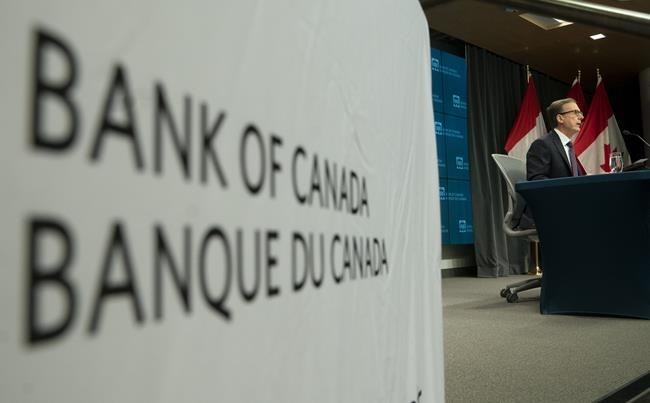OTTAWA — The Bank of Canada says it plans to more closely monitor how increasingly frequent and severe weather events could impact the prices consumers pay for goods as part of its mandate to keep inflation in check.
The central bank's promise Wednesday, which it linked to the UN climate summit in Glasgow, U.K., will also see it explain in a more public way how climate change could impact the path of the Canadian economy.
The announcement comes just ahead of a report the bank intends to publish about the risks climate change poses to the financial system, including granular details on sectoral impacts, and a renewal of the Bank of Canada's mandate.
The central bank is mandated to keep annual inflation rates hovering around two per cent, but its monetary policy framework gets renewed every five years.
Conservative Leader Erin O'Toole warned Prime Minister Justin Trudeau in a letter late last month that his party will oppose any "growth or other social mandate expansions" to the Bank of Canada's mandate.
Although not officially part of the Bank of Canada's marching orders, other central bankers argue they should take more of a leading role in helping economies adapt to climate change.
"We cannot leave them in a blind spot, and it will haunt us back if we're not fully aware of it," Alejandro Diaz de Leon Carrillo, governor of the Bank of Mexico, said Wednesday during a virtual panel hosted by the Toronto Centre.
Speaking on the same panel, Bank of Canada deputy governor Toni Gravelle said policies to mitigate the impact of climate change will slow economic growth as carbon-intensive sectors that have helped fuel gains shrink significantly.
He also said there could also be an impact on the financial system, noting the possibility of losses as prices drop for assets not considered as green as others.
It's why Gravelle said there needs to be better climate-risk disclosures from corporations so financial institutions understand their own exposure.
Duff Conacher, co-founder of Democracy Watch, said in a statement that the big banks and financial institutions shouldn't be allowed to keep details of their fossil-fuel industry loans, investments and insurance secret, or be allowed to make up their own voluntary disclosure and investment standards.
The Bank of Canada has been working with some of the country's largest banks to get a handle on what that risk looks like to help them and others in the financial system wrap their heads around the financial risk climate change poses.
That report, Gravelle said, is due out by the end of November or early December. It will include what he described as how-to guides for reporting risk.
That work will likely dovetail with an international reporting body's decision to locate one of its offices in Montreal. The Chartered Professional Accountants of Canada said it would help create one reporting standard.
Gravelle said the looming economic change would be similar to how much technological innovation affected the economy over the last few decades, except "on steroids" that would have broad impacts on sectors and labour markets.
Mitigating the impact would require investments in productivity-enhancing technology that would make workers more efficient, he said.
"The problem is you've got to line up the policies, you have to get the incentives right, and that in the short term might feel very hard to swallow, but in the long term, you have actually a lot more jobs, you have an economy that's much more flexible," Gravelle said.
This report by The Canadian Press was first published Nov. 3, 2021.
Jordan Press, The Canadian Press


